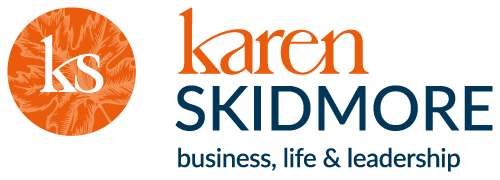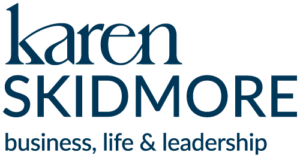
by Karen Skidmore | 06,22 | Leadership, Stories, inspirations & thoughts for the day
Having people around you who support what you do is important; it can be a very lonely job running your own business. Being able to pick up the phone, meet up for a walk or coffee and talk about what’s been going on in your week with someone you trust and feel comfortable around is important.
But how many of these people are too safe?
Over the many years of running my own coaching and training businesses, I have hung out with all kinds of people. I started networking as soon as I began my first coaching business in 2004. It was before the days of LinkedIn and Facebook so the only way to meet people was to be in the room with them.
But so many of the events were stiff and formal affairs, either full of grey suited men or ladies who lunched. It didn’t take me long to start up my own women’s networking group, which over the years grew to encompass four locations, attracting 25+ ladies at each event.
However, over the years I began to see how much I was playing it safe.
It was good to be the leader of my own events, but there was a pattern of sticking to networks that I felt safe and comfortable. And this, of course, led to me having lots of safe and comfortable business buddies.
I started to fall out of love with networking because every event I went to seemed to attract the same people who talked a good game, and looked the part, but appeared to be so busy networking that they were morphing into each other, saying the same things, and often moaning about the same things!
At the same time, I had taken up playing tennis. Not competitively, but taking part in weekly classes with other mums at school. I loved it and soon realised that I always played better when I played against stronger players. Yes, I still made plenty of mistakes and smashed the ball up and over the fences (erratic was probably how I described my game!) … but the good shots I did play were brilliant. I may never have won any tournaments, but my game play improved significantly each time I was against a better player.
And I see the same with the people we choose to play with in business.
Networking now, of course, is very much a hybrid affair. The choices we have are endless but this has opened up huge opportunities to find yourself in safer, virtual events; sitting in a zoom room where it may be full of lovely people, but if you take a step back and get really honest about yourself, you are playing down and probably the “smartest person in the room”.
Choosing safe, comfortable places to meet safe, comfortable people in the early stages of your business can be the right thing to do to help build your confidence. Like my tennis, if I went straight to the school mum’s tournament without any lessons, I would have been smashed all over the place and not even have had the chance to return a ball.
Frustrating for the others on the court … downright embarrassing for me! I am not sure I would have gone back for more and probably told myself there was no point taking lessons because tennis was obviously not my game. So safe, comfortable at the start is critically important to allow you to build your confidence.
But over time, it’s very easy to stay in those safe, comfortable places with those safe, comfortable people, particularly as we begin to get more confident in getting ‘back in the room’ and start to want to attend workshops, conferences and retreats.
And when you see it, which I hope reading this has given you that lens, you realise the people who were instrumental to helping you through the last few years, aren’t the ones to take forward and beyond.
This isn’t being egotistical … this is thinking strategically and having a CEO Mindset.
One of my favourite quotes that I used to have up on my wall in my first few years of business, is from Jim Rohn …
You become the average of the five people you spend the most time with.
If that average is of the safe, comfortable people you are still hanging out with and discussing your business with, can you see that it may be time to go find some different people … some ‘unsafe’ people who can raise your game because they are stronger players.
And this also applies the same to your trusted friends or family members. Talking through your next big idea for your business with your spouse can often be the worst thing you can do; they love you, they want you to succeed but they also want to protect you and keep you safe.
Again, with friends who you’ve been through ‘thick and thin’; they love you, they want you to succeed but they also want to protect you and keep you safe.
Of course, I am not suggesting you keep important changes to your business a secret from your loved ones … but choose when and how you tell them, remembering you have a choice of what response or advice you want from them. If you aren’t confident with the idea that you’ve got or have a roadmap in which to execute it, talking it through with someone who wants to keep you safe can extinguish your flame very quickly, pulling you back down to safer, more comfortable levels.
I work with so many midlifers who either can’t or don’t want to pull back on their aspirations, and seeing this safety net can hugely open them up to taking the right risks and being able play a bigger, stronger game.
Where are your ‘unsafe’ people who are going to stretch you onto the next phase of your business?
What networking groups or business buddy circles do you may need to move on from?
You don’t have to say goodbye and never speak to these people again … but actively choosing those five people you want to become the average of is critical if you want to scale and grow your business.
If you want to discuss how you can release yourself from your safety net, then let’s talk. Book a Next Level Business Strategy Session with me. There’s never any charge for our first call together.
Looking for your next step to take?
Let’s talk through your current product offerings and I can help you see where you could be running your business smarter – book a Next Level Business Strategy Session with me. There’s never any charge for our first call together. Click here to check out times available.
Until next time, do less, be more, play bigger.


by Karen Skidmore | 06,22 | Leadership, Midlife & Menopause
We have the habit of overestimating the life shit that comes our way.
And underestimating the power and influence we believe we already have.
This was the hard truth that I was told yesterday by one of the world’s leading experts on mindset and women’s leadership.
As Ambassador for The Hunger Project and leader of the Unleashed Women movement here in the UK, I had the honour of interviewing Cathy Burke, who has a 20+ year history with the charity, previously Country Director of Australia and then Global VP, and now Global Ambassador.
Along with asking her about her work with The Hunger Project, I also wanted to know her thoughts on why so many midlife women drop out of leadership and professional careers. With everything I do, my overriding mission is for the empowerment of women to ensure more women in their 50’s, 60’s and beyond are in positions of power to influence our economic, political and social infrastructures and outcomes.
So I asked for her thoughts on the matter.
There was much she shared on this, which I will share more about in the future, but what hit me hardest was this truth (and yes, this her truth … not THE truth) that many women have a habit of overestimating the shit and problems that we have to deal with, whilst at the same time underestimating how much power and influence we already have.
Wow! Is it really possible that we make too much of the things that drag us out of positions of power, leadership and influence?
I get the second part about not believing in the power that we already have within us to step up and make the difference. How many times have we felt lonely, forgotten, ignored, belittled by what someone has said to us or pulled back because we felt others were so much better than us? I know I have.
But to be told that I may be over-egging my life shit stuff?
Now I know this will be triggering to so many of us – me included! I have had to deal with a growing family, a chronic health crisis in my 40’s and in more recent years, eldercare responsibilities.
Have I really made too much of this over the years?
But as I reflected, I saw that this is not about the actual shit we have to deal with that’s important here, because yes there are so pretty BIG shitty things that happen in life. It’s the how, when and where we choose to focus our time, energy and attention moving through them. Or as Jo Blackwell, Founder of The Midlife Movement, commented on my piece on this on LinkedIn yesterday … it’s the “times when you overestimated the emotional energy needed to deal with it.”
Because yes, I am a white, privileged female who is well aware of all the amazing support and access to resources she has in her life. And when put into context of what so many others have to contend with, and our huge global problems, I can see that yes, I have absolutely overestimated the amount of emotion and energy I needed to deal with life shit at times.
This plays out as having way too many hours of worry, and sometimes sleepless nights on things that aren’t so bad when put in the context of what’s happening in the world. These times have not only taken my attention away from projects that needed with my time, attention and leadership, but also sucked me dry, often leading me to further health complications and my burn out symptoms returning, and left me with little for anything else, let alone my desire to make a difference in this world.
I don’t write this as a preach, or even pretend that a lot of life shit is not really shit, but I do wonder if you recognise times when you overestimated the emotional energy needed to deal with life shit.
And yes, there is the caveat that there are times that we absolutely need to take time out, to rest and recover and be with the people – or even ourselves – at certain times in our lives. But … and this is a BIG BUT … if there is a burning desire in you to step up, to up level your business and your leadership, or to contribute to something far bigger than you, then this overestimating habit can no doubt pull us back from our potential to make a bigger difference.
I’d love to know what you think. Leave a comment below with your perspective on this and what this throws up for you.
Until next time, do less, be more, play bigger.


by Karen Skidmore | 05,22 | Business Planning, Leadership
Being able to make good decisions is one of the keys to adopting a CEO mindset and growing a successful business.
But decision fatigue is real; the more decisions you have to make each day, your ability to make decisions becomes worse.
We’re faced with thousands of them every day, from the mundane (What to cook for dinner?) to the business-changing (Can I trust this person?). And for most of us right now, we are still reeling from the past two years of making decisions about stuff we never had to think about before (Which way do I walk through this supermarket? Do I have to wear a mask? Is it OK to hug this person?).
I always prided myself on being able to make quick decisions. Even at the start of my career, I realised I was able to process information fast and see where the real problem was.
But as I got older, my brain got faster as I took on more and my expectations of myself climbed, and the decisions I was making became more knee-jerk and reactive as I jumped from one task to the next.
I simply couldn’t keep up with what life and business was throwing at me so when I hit my 40’s, exasperated by peri-menopausal symptoms of brain fog and exhaustion, I found that I didn’t trust myself to make good decisions any more. And this had a direct impact on my business.
Procrastination not only slows down growth … it’s exhausting!
To be able to get better at making good decisions, it’s important for us to learn how to first trust ourselves, our own judgement and instincts.
The first step in trusting yourself is knowing that you don’t have to be good at everything, all the time.
I get that we have incredibly high expectations of ourselves, largely because of our society’s expectations (You can have it all; be a perfect mother AND run a successful business), but also because of experiences we had growing up both at home and at school. But let’s be real: nobody is perfect. Nobody ever will be.
No matter how much we try to make ourselves into some sort of superhuman machine, everyone drops a ball or makes a mistake from time to time. And that’s okay! It doesn’t mean we’re horrible people or should feel ashamed about ourselves; it just means that being human means not being perfect all the time.
So giving yourself a break and being kinder to yourself, particularly on the days you feel more tired than usual or you’re juggling family needs, is critical to allowing yourself the time to step back and give yourself some breathing space.
Trusting your gut is something you have to work at.
The older we get and the more responsibilities we take on, the busier our heads get and the longer our to-do-lists grow. When your head starts controlling your life, it’s easy for it to override any intuition or instincts you may have. And when you get so busy that you forget to give yourself the space to hear the advice from inside of you, that connection can get cut off.
It’s the same as working out and keeping fit; if you stop, your body loses the muscle definition you gained, and your fitness levels go down.
The next time you are faced with a decision, instead of panicking or saying “I don’t know” – take a moment , close your eyes and listen closely inside yourself first. If you really don’t know how to do this (and yes, ten years ago I was so ‘in my head’ that I really didn’t know how to hear what my instinct was telling me!), then take note of my next point.
Spend more time in your body.
Many of us will exercise for the sake of fitness and health, measuring success by steps or sweat. But because so much business is often solved in our heads, these kinds of exercises can feed the brain; giving you more things to take action on and complete.
Spending time moving your body consciously can really help you connect with the neural pathways that run around your body. Movement such as dance – prancing around the kitchen rather than following a structured class – and slower walking focused on your posture – noticing how your feet connect with the ground with each step – can be simple ways of sensing your body and spending time ‘out of your head’.
Recognise that fear is different from intuition
… and sometimes it can be good to take the moment to ask the fear what it may be trying to tell you. Is there anything that you can put in place to make your next steps less risky for you? Perhaps you need more time to put your decision into action … maybe you need to hire some help?
If you choose to ignore your fears, you may find that you procrastinate and pull yourself back from taking action. So use your fear to shine a light on anything that you may avoid simply because it feels uncomfortable as this can be helpful in making sure you don’t avoid taking action on your decisions.
Be prepared for change, even if it means sacrificing some things you really care about.
Trusting yourself means putting your faith in your ability to make good choices and decisions. It means taking risks without being afraid of the consequences.
If you really want to take your business up a level, then there is every chance you are going to have to stop doing some of the things you are doing right now – and yes, that includes certain clients, programmes and team members you may really care about – and do something different.
This may mean that you stop offering a particular service, programme or product; it may mean you have to change your pricing structure; it may mean you have to fire one of your team members.
You can not grow a business without change. Get comfortable with that concept because trusting yourself means knowing when to let go and when to hold on.
You must trust yourself even when the outcome seems uncertain and you may not know all the answers.
One podcast I’ve got into recently is The Diary of a CEO. I was particularly taken by one of his more recent ones – Moment 54: How you should make every big decision with guest Rochelle Humes.
They reference a conversation he had with Barack Obama and his 51% decision making rule. Steven says “It comes down to if we are always looking for 100% of the facts, data and certainty to get our decisions over the line, it leads to huge procrastination and time-wasting. Getting to that 51% is a much more efficient system, and it reassures us that it will be the right decision to make.”
Knowing that we can make another decision or even reverse it if needed can open us up to bigger thinking and bolder decision making … and that the cost of procrastinating and trying to be more than 51% in favour for, or against of that decision is potentially huge.
I like this idea of having your logic brain to be only 51% convinced … it opens up to trusting our intuition more.
Next week, I want to dive into the importance of slowing down, and how going slow can actually speed up your progress. So for now, comment below and let me know what resonates with you here.
Until next time, do less, be more, play bigger.

Are you ready to take your business to the next level?
Join me at Elevate – a transformational, all-inclusive business retreat at a luxury spa venue right in the heart of the beautiful Surrey/Hampshire borders countryside.
Elevate Business Retreat with Karen Skidmore

by Karen Skidmore | 05,22 | Business Planning, Leadership
Last week, I was writing about the difference between being a freelancer, business owner and CEO, and the phrase that seemed to get the biggest reaction was …
“You may think you are a business owner, and call yourself a business owner, but your current work schedule has pushed you back to being a busy freelancer, simply at a higher revenue.”
And yes, several of you shared with me the frustration that even though they may be selling more, they aren’t earning any more. They were busier AND poorer. Ouch!
So what to do?
The usual reactions are to work harder at finding the right marketing strategy; to create a new suite of offers and products so you have more to sell; to go find yourself more customers.
All the above can work but only to a point.
The real shift in your future growth comes from how you are thinking, your behaviour and thus the actions you take.
And this is where your CEO mindset comes in.
Most people start with action, and this is what is celebrated the most in our entrepreneurial culture (you’re killing it … let’s get shit done … you smashed your targets). Of course, action is critical, but if you are already busy, bouncing from one thing to the next, you aren’t really making decisions … you are simply reacting.
And if you are tired and already working to capacity, your ability to think strategically is significantly hampered. Your brain is working super fast, keeping multiple tabs open (and often throughout the night!) and the only thing you are capable of doing is dealing with what’s right in front of you.
Great for dealing with a crisis … not so great for strategy and growing your business.
So how do you begin to switch from crisis management to strategic thinking?
There are three key behaviours that can directly impact your ability to think strategically
- Trust
- Ability to slow down
- Breaking the YES habit
Today, I want to dive into breaking the YES habit, and how saying yes to everything is great at the start of your business journey, but at some point, hinders you significantly.
When you first start out, saying yes opens you to opportunities and possibilities that you may never have considered before. It gets you your first few clients and projects, and builds your confidence.
But at some point, the clients and projects you say yes to start to pull you in too many directions. And if you don’t have clear boundaries and know the direction you want to be headed, you become reactive and transactional.
You begin to behave like a fast food server … “Would you like fries with that? And a large drink?”
If you are good at what you do, then your diary can fill up over time with projects and delivery, but you speed up, work faster, and eventually you have no space to breathe. And, believe me, a fully booked diary is NOT a good problem to have. It can leave you exhausted at best, and burn out at worst.
If you’ve found yourself heading this way, then there are some quick fix ways of taking back control.
1. Go long
Don’t try to fix your busy diary in the short term; it’s too stressful to try to push back projects (unless of course, this is an emergency health crisis and you really don’t have any other option but to cancel for the sake of your wellbeing!). Go to the point in your diary where the weeks start to be a little clearer.
This may be in two months time or further … no matter … but from wherever it’s starts to clear, block out a dozen or so days for the next three months as non-negotiable, non-bookable days for anyone but you.
Don’t worry about what you are going to do with that time right now … you just need to be sure you have this time blocked out so you stop the habit of saying yes to everything that comes your way. This blocked out time in the future will be critical to give you the space you need to work ON your business, rather being IN it all the time, and to allow for strategic thinking and decision making.
2. Audit your current diary & cancel anything that isn’t business critical
Have you got network meetings or buddy support groups that are no longer serving you? Have you got meetings with people booked in with you who just want to pick your brain, rather than be interested in buying one of your programmes … or want a chat about how you can collaborate together? What have you said yes to because it felt good to say yes at the time, but now with the power of commercial hindsight, it’s just another distraction and a thief of your time?
3. Batch
Batching is one of the most powerful things you can do with your diary, because bouncing from different calls and meetings throughout the day takes a lot of mental energy to switch and transition. Ideally, you want to have sales calls on one day, and client delivery on another; you are showing up differently so stay in sales flow for your sales calls, and then stay in delivery flow for your delivery.
You also don’t want to be squeezing in tasks such as invoicing, proposal writing and content creation in between meetings, sales calls and delivery, so start to book in time chunks to get this work done.
I’d also recommend batching weeks as you start to take back control of your diary. For example, you could have full delivery weeks for three weeks of the month, which could then allow for one clear week of no delivery each month to allow you to have space to work on projects that will build your business.
4. Schedule time in your diary for preparation AND recovery
It’s easy to only put appointments into your diary, and then forget about the before and after. For many of my clients, their work can be full on, especially if they are delivering in person (coaching, training, consulting), and not recognising the need for recovery time means you put yourself on a conveyor belt of doing, doing, doing, and then collapse.
5. Set clear rules for how you want to work
You may be very clear on how you would love to work, but have you written down the rules to make this happen? For example, I hear a lot of people say they want to work less hours. So if you want to NOT work Fridays, when was the last time you said NO to a project or meeting that happened on a Friday.
Stop, write down 3 or 4 rules of how, when, where and with whom you want to work and stick it up on the wall next to your desk. Looking at these rules BEFORE you say yes to anything, will help begin to break your YES habit and set new and better behaviours.
Next week, I want to dive into the importance of trust; trusting yourself, trusting your business and learning to trust others so you break the habit of thinking you have to be the one to do everything yourself.
So for now, comment below and tell me which one of these five things you are going to do today. Then let know next week what difference it’s made to your YES habit.
Until next time, do less, be more, play bigger.


by Karen Skidmore | 05,22 | Business Planning, Leadership
Wow, what a week! I’m writing this just as I come to the end of our first week of our next new Momentum planning cycle, which is always a high energy, back-to-back week of calls, and I wanted to share with you today my thoughts about being a CEO in your business.
Between Melina and myself, we’ve spoken to almost all our members to ensure they are clear on what their next priorities are for the coming months, and I am super impressed with the up level of thinking this year, far more than previous years.
Visions feel bolder.
Targets seemed to be stretched more.
Health and wellbeing being taken more seriously.
One member told me this morning that his most recent contract win was at twice the price he would have considered offering at last year before he joined.
Another shared how her profits have increased tenfold since the start of last year.
And many of the conversations highlighted how much more confident they felt as a business owner.
As I have been processing and reviewing what we have been doing differently from previous years, it’s become clear to me that my focus on transforming our members from being a busy freelancer to being a business owner and then ultimately adopting a CEO mindset, has an integral part.
You see, everyone usually starts their business as a freelancer.
You do everything; from marketing and website copywriting to selling and delivering client work, and what you do sell is usually your time and expertise so it’s a trade of time for money.
At some point, you bring enough business in to merit hiring your first support person and you start to work on what systems and processes are needed to run your business.
You start to become a business owner; you may still be the only one delivering client work, but some of your focus during the week is on how the business works – the marketing systems, follow up emails, proposal templates and creation of products or programmes.
But the bigger the contracts, the more programmes you sell and the more clients you attract, the less of you there is to go round.
The dynamics of your working relationships with your clients start to change and there’s every chance you start to feel overstretched.
When this starts to happen your business can start to feel like project management hell; you begin to drop some balls and you don’t get the chance to catch your breath or take the time out to work on your own development because you are spending all your time either working with clients or working on the projects to support your business structure and processes.
You may think you are a business owner, and call yourself a business owner, but your current work schedule has pushed you back to becoming a busy freelancer again, simply at a higher revenue.
And this is where the importance of having a CEO mindset comes in.
If you want to grow your business beyond a certain point, then you have to stop treating your business as something you do, and start getting clear about who you want to become … the role you want to play, the life you want to have outside of your business (because you do have a life outside of work, yes?!) and the bigger impact you want to make.
And it’s this CEO mindset that can make all the difference to how you think strategically about where to focus your time, resources and energy.
Over the next few weeks I want to share more with you about who it is you need to be and what it really takes to become a CEO, and share how to break the patterns of behaviour that keep you in freelancer and business owner mindset, and how to develop new rituals and practices to harness your CEOship power.
For now, I’d love to know where you feel you are right now. Are you behaving like a freelancer, a business owner or CEO? Have you distinguished the difference between them before?
Leave a comment below as I’d love to know how this resonates with you.
Until next time, do less, be more, play bigger.


by Karen Skidmore | 10,21 | Ebb & Flow, Leadership
Our work culture is not working for us anymore!
For the past thirty years, our obsession with doing more in less time has exponentially increased. The access to the first home computers and the World Wide Web has opened us to an endless stream of technology to make us more efficient. Today, our smartphones can tell us how well we are eating, sleeping and running, and we have access to an endless supply of productivity apps to help us do more in less time.
Our work boundaries are so blurred that most of us now feel panicked if you ever leave the house without your smartphones, and it’s been reported that 71% of people sleep either holding their smartphone, having it in bed with them, or having it on their nightstand. It’s the first thing they look at when they wake and the last thing they see before they close their eyes at night.
But with all this technology to allow us to do more in less time, how productive are we really?
In the UK, Britons are working an average of 42.5 hours a week, and my guess is that you are probably exceeding this if you include the time spent on your phone, checking emails and hours thinking about work when you are not sitting at your desk.
It’s not just the physical hours spent working; it’s also the mental load of not switching off when you close down your laptop.
Not surprisingly, it turns out we are simply not designed to be working this hard. We have been taught to work in a linear way throughout the year, not taking into account our seasons, changing daylight hours or our own body’s natural rhythms and hormone cycles.
Work and life is designed in 24 hour cycles.
And yet 50% of the population don’t work this way!
Binary female hormones typically work around a 28 day cycle (our menstruation cycle), whereas binary male hormones typically work around a 24 hour cycle. It’s not that women can’t work to a 24 hour clock, but our linear work culture has programmed us to be productive day in, day out, often striving to do more, in less time, and not taking into account our own body’s natural rhythms and hormone cycles.
Plus 2020 has seen unprecedented changes to the way that we all work. Even for those of you who already worked from home, you’ve been dealing with the challenges of isolation, endless Zoom calls, children home from school and partners working from home with you.
A recent study from LeanIn.org found that women who have full-time jobs have taken on way more housework and caregiving than men during the pandemic; estimated at an extra 20 hours a week, compared to men, on top of their 40+ hour working week.
And that’s not all. If midlife women don’t already have enough to contend with, the menopause can hit you like a freight train! If you are already experiencing levels of stress, peri-menopausal symptoms such as brain fog, fatigue, raging headaches, aching bones and hot sweats, can slow us down and be incredibly frustrating and exhausting.
How I learnt to change my hard work story
Back in 2012, I hit burnout hard. Still reeling from losing my dad to cancer two years previously, I found myself unable to function and couldn’t get out of bed one weekend. I can look back now and see all the signs; the extreme fatigue, brain fog, body in pain. But because I had programmed myself to keep working hard at trying to get everything to work – life, business, family – I ignored the signs and just kept working harder to keep all the balls in the air.
I was sandwiched between life and business, squashing myself harder as I tried to keep up with it all.
That summer was the start of five years of horrid hormonal imbalance and peri-menopausal symptoms which I realised couldn’t be fixed with a pill or a two week holiday. I had to reset, reboot and take some serious rest, and yet I felt really guilty about taking my foot off the pedal.
I had images of just laying on the sofa and watching daytime TV all day, whenever I was challenged that I may need to rest and do less in my day-to-day life. I just couldn’t do that! I had things to achieve and resting wasn’t something I had been taught how to do.
But I came to realise that doing less isn’t about doing nothing. It’s about doing less of the busy stuff, and doing more of what matters to us and the values we want to live by. And doing it in a way that flows with our natural cycles and energy ebb and flows.
One of the areas that needed to change was the way I was working, and I started on a journey of exploring and understanding what working less hard actually meant. Today, I bring everything that I have learnt condensed into my Ebb & Flow programme, a new approach to managing work, time and energy.
It’s time to stop trying to work to our modern, fast-paced schedules and work productivity expectations (often designed for how factories and assembly lines work, rather than human beings), and experience how to get out of your head, slow down your race to success and embrace your natural work flow and leadership style.
And it all starts with this simple, easy to follow 28 Day Energy Tracker.
How to use this 28 Day Energy Tracker
Step One: Download a copy right here
Step Two: Print the 28 Day Ebb & Flow Energy Tracker (page 8 in the PDF)
This process is best done analogue because you will be doing this first thing in the morning and last thing at night. You don’t need to open your phone or look at a screen to follow this process.
Step Three: Your Morning Tracking
There are five things to track first thing in the morning:
- Where you are in your menstrual cycle
- What phase the moon is in
- What the weather is outside
- What time the sun rose
- What was the quality of your sleep
What you are collecting is objective data; data that can be measured consistently and is not influenced by emotion or opinion. When you download the energy tracker, you will be able to read more about how these five things are relevant and how they can affect their energy levels.
Step Four: Your Evening Tracking
At the end of each day, you will decide how in flow you felt and give your energy flow a score out of ten.
This data is subjective, and these scores will be influenced by your levels of stress, tiredness and what you’ve actually done each day. In the energy tracker download, I will help you define your flow to make it easy for you to track consistently.
Step Five: What do you notice?
At the end of the 28 days, notice what patterns occur.
- Did you experience a higher level of energy flow at different times of your menstrual cycle?
- How did the weather or the season affect your energy flow?
- Perhaps you discover your work patterns change with the different phases of the moon, and different kinds of tasks are more easily achieved on different days?
You have a small section to make your own notes on what you notice, but I would encourage you to get yourself a journal to use alongside this tracker to help you expand your thoughts over the coming weeks and months, especially as energy tracking becomes part of your every day routine.
28 days will give you a really great starting point in which to spot your natural cycles, but the more data you collect over more months, the more you will see patterns appear over a longer period of time, especially if you are transitioning through the menopause or recovering from a long term illness.
When I first started experimenting with energy tracking, the biggest benefit I felt was the realisation that I had good days in between the not-so-good days, which really helped me appreciate the days I felt better, and how much in flow I was in and how much I did achieve on those days. It made me realised that I wasn’t failing all the darn time; the not-so-good days stopped playing such a dominant role in who I was defining myself as!
Over the years of doing this kind of energy tracking, I have narrowed down the key things to notice and simplified the process to create this energy tracker that you have access to today. It has since become the bedrock for helping me begin to predict how my energy ebb and flows really worked, and how I could ensure I could achieve what I wanted to do, whilst thriving in the process. And I would love for you to experience this, too.
Let me know how you get on with this simple and easy to use energy tracker. And for those of you who want to continue in the journey, look out for details of our Ebb & Flow programme starting early 2022.
Thank you for reading. Until next time, do less, be more, play bigger.













